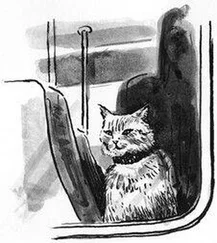“Did they leave a note?” he asked. Arden Bensenhaver stared at him. The doctor looked down at the floor. “You know, about a ransom ?” Standish said. He was a literal man struggling for a literal hold. Someone, he thought, had said “kidnap"; wasn't there ransom in the case of kidnap?
“There's no note, Mr. Standish,” Bensenhaver told him. “It doesn't look like that kind of thing.”
“They were in the bedroom when I found Nicky outside the door,” Margot said. “But she was all right when she left, Dorsey. I saw her.”
They hadn't told Standish about Hope's panties, discarded on the bedroom floor; they'd been unable to find the matching bra. Margot had told Arden Bensenhaver that Mrs. Standish was a woman who usually wore a bra. She had left barefoot; they knew that, too. And Margot had recognized Dorsey's shirt on the farm kid. She'd got only a partial reading of the license plate; it was an in-state, commercial plate, and the first two numbers placed it within the county, but she hadn't gotten them all. The rear plate had been spattered with mud, the front plate was missing.
“We'll find them,” Arden Bensenhayer said. “There's not much in the way of turquoise trucks around here. The county sheriff's boys will probably know it.”
“Nicky, what happened?” Dorsey Standish asked the boy. He sat him on his lap. “What happened to Mommy?” The child pointed out the window. “So he was going to rape her?” Dorsey Standish asked them all.
Margot said, “Dorsey, lets wait until we know.”
“Wait?” Standish said.
“You got to excuse me asking you,” said Arden Bensenhaver, “but your wife wasn't seeing anybody, was she? You know.”
Standish was mute at the question, but it seemed as if he were importantly considering it. “No, she wasn't,” Margot told Bensenhaver. “Absolutely not.”
“I got to ask Mr. Standish,” Bensenhaver said.
“God,” Margot said.
“No, I don't think she was,” Standish told the inspector.
“Of course she wasn't, Dorsey,” Margot said. “Let's go take Nicky for a walk,” she said to him. She was a busy, businesslike woman whom Hope liked very much. She was in and out of the house five times a day; she was always in the process of finishing something. Twice a year she had her phone disconnected, and connected again; it was like trying to stop smoking is for some people. Margot had children of her own but they were older—they were in school all day—and she often watched Nicky so that Hope could do something by herself. Dorsey Standish took Margot for granted; although he knew she was a kind and generous person, those were not qualities that especially arrested his attention. Margot, he realized now, wasn't especially attractive, either. She was not sexually attractive, he thought, and a bitter feeling rose up in Standish: he thought that no one would ever try to rape Margot—whereas Hope was a beautiful woman, anyone could see. Anyone would want her.
Dorsey Standish was all wrong about that; he didn't know the first thing about rape—that the victim hardly ever matters. At one time or another, people have tried to force sex on almost anyone imaginable. Very small children, very old people, even dead people; also animals.
Inspector Arden Bensenhaver, who knew a good deal about rape, announced that he had to get on with his job.
Bensenhaver felt better with lots of open space around him. His first employment had been the nighttime beat in a squad car, cruising old Route 2 between Sandusky and Toledo. In the summers it was a road speckled with beer joints and little homemade signs promising BOWLING! POOL! SMOKED FISH! and LIVE BAIT! And Arden Bensenhaver would drive slowly over Sandusky Bay and along Lake Erie to Toledo, waiting for the drunken carfuls of teen-agers and fishermen to play chicken with him on that unlit, two-lane road. Later, when he was the police superintendent of Toledo, Bensenhaver would be driven, in the daytime, over that harmless stretch of road. The bait shops and beer palaces and fast-food services looked so exposed in the daylight. It was like watching a once-feared bully strip down for a fight; you saw the thick neck, the dense chest, the wristless arms—and then, when the last shirt was off, you saw the sad, helpless paunch.
Arden Bensenhaver hated the night. Bensenhaver's big plea with the city government of Toledo had been for better lighting on Saturday nights. Toledo was a workingman's city, and Bensenhaver believed that if the city could afford to light itself, brightly, on Saturday night, half the gashings and maimings—the general bodily abusings—would stop. But Toledo had thought the idea was dim. Toledo was as unimpressed with Arden Bensenhaver's ideas as it was questioning of his methods.
Now Bensenhaver relaxed in all this open country. He had a perspective on the dangerous world that he always wanted to have: he was circling the flat, open land in a helicopter—above it all, the detached overseer observing his contained, well-lit kingdom. The county deputy said to him, “There's only one truck around here that's turquoise . It's those damn Raths.”
“Raths?” Bensenhaver asked.
“There's a whole family of them,” the deputy said. “I hate going out there.”
“Why?” Bensenhaver asked; below him, he watched the shadow of the helicopter cross a creek, cross a road, move alongside a field of corn and a field of soybeans.
“They're all weird,” the deputy said. Bensenhaver looked at him—a young man, puffy-faced and small-eyed, but pleasant; his long hair hung in a hunk under his tight hat, almost touching his shoulders. Bensenhaver thought of all the football players who wore their hair spilling out under their helmets. They could braid it, some of them, he thought. Now even lawmen looked like this. He was glad he was retiring soon; he couldn't understand why so many people wanted to look the way they did.
“"Weird"?” said Bensenhaver. Their language was all the same, too, he thought. They used just four or five words for almost everything.
“Well, I got a complaint about the younger one just last week,” the deputy said. Bensenhaver noted this casual use of “I"—as in “I got a complaint"—when in fact Bensenhaver knew that the sheriff, or his office, would have received the complaint, and that the sheriff probably thought it was simple enough to send this young deputy out on it. But why did they give me such a young one for this ? Bensenhaver wondered.
“The youngest brother's name is Oren,” the deputy said. “They all have weird names, too.”
“What was the complaint?” Bensenhayer asked; his eyes followed a long dirt driveway to what appeared to be a random dropping of barns and outbuildings, one of which he knew was the main farmhouse, where the people lived. But Arden Bensenhaver couldn't tell which one that might be. To him, all the buildings looked vaguely unfit for animals.
“Well,” the deputy said, “this kid Oren was screwing around with someone's dog.”
was “Screwing around"?” Bensenhaver asked patiently. That could mean anything, he thought.
“Well,” the deputy said, “the people whose dog it was thought that Oren was trying to fuck it.”
“ Was he?” Bensenhayer asked.
“Probably,” the deputy said, “but I couldn't tell anything. When I got there, Oren wasn't around—and the dog looked all right. I mean, how could I tell if the dog had been fucked?”
“Should've asked it!” said the copter pilot—a kid, Bensenhayer realized, even younger than the deputy. Even the deputy looked at him with contempt.
“One of these half-wits the National Guard gives us,” the deputy whispered to Bensenhaver, but Bensenhaver had spotted the turquoise truck. It was parked out in the open, alongside a low shed. No attempt had been made to conceal it.
Читать дальше












